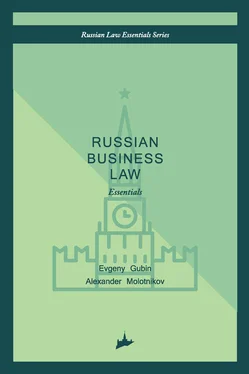Evgeny Gubin - Russian business law - the essentials
Здесь есть возможность читать онлайн «Evgeny Gubin - Russian business law - the essentials» — ознакомительный отрывок электронной книги совершенно бесплатно, а после прочтения отрывка купить полную версию. В некоторых случаях можно слушать аудио, скачать через торрент в формате fb2 и присутствует краткое содержание. Город: Moscow, Год выпуска: 2016, ISBN: 2016, Жанр: foreign_language, Юриспруденция, popular_business, на английском языке. Описание произведения, (предисловие) а так же отзывы посетителей доступны на портале библиотеки ЛибКат.
- Название:Russian business law: the essentials
- Автор:
- Жанр:
- Год:2016
- Город:Moscow
- ISBN:978-5-9904334-9-6
- Рейтинг книги:3 / 5. Голосов: 1
-
Избранное:Добавить в избранное
- Отзывы:
-
Ваша оценка:
- 60
- 1
- 2
- 3
- 4
- 5
Russian business law: the essentials: краткое содержание, описание и аннотация
Предлагаем к чтению аннотацию, описание, краткое содержание или предисловие (зависит от того, что написал сам автор книги «Russian business law: the essentials»). Если вы не нашли необходимую информацию о книге — напишите в комментариях, мы постараемся отыскать её.
Russian business law: the essentials — читать онлайн ознакомительный отрывок
Ниже представлен текст книги, разбитый по страницам. Система сохранения места последней прочитанной страницы, позволяет с удобством читать онлайн бесплатно книгу «Russian business law: the essentials», без необходимости каждый раз заново искать на чём Вы остановились. Поставьте закладку, и сможете в любой момент перейти на страницу, на которой закончили чтение.
Интервал:
Закладка:
In the late 2000s, Russia experienced a situation that affected many other countries – the financial crisis of 2008, and the ensuing recovery. In March 2010, the World Bank report noted that the losses of the Russian economy were lower than expected at the beginning of the crisis, due to effective anti-crisis measures taken by the government. [10] World Bank Believed In Russia (Всемирный банк поверил в Россию), RBK (РБК), March 24, 2010, http://top.rbc.ru/economics/24/03/2010/383833.shtml.
However, the period of stability after the recovery from the financial crisis did not last long.
Since the beginning of 2014, the economy has been in stagnation. The outflow of capital from Russia in 2014 amounted to a record $151.5 billion. [11] Net capital outflow from Russia in 2014 amounted to $151.5 billion (Чистый отток капитала из России в 2014 году составил $151,5 млрд.), RBK(РБК), Jan. 16, 2015, http://top.rbc.ru/finances/16/01/2015/54b96c5e9a7947490508d8d2.
Moreover, the Russian ruble experienced significant fluctuations and even collapsed against Euro and the US dollar. There were several reasons for this, but the primary reasons were low oil prices, and a political crisis in relations with Ukraine, followed by mass economic sanctions from the US and the EU.
This brief description of the Russian economy development shows that in the last 25 years, the longest period of the economic stability was less than 5 years. Thus, entrepreneurship, being dependent on the overall economic conditions in the country, has always faced challenges during its development.
3. Business Law Evolution
After a brief historical background on the economy and entrepreneurship development in Russia, it is important to become familiarized with the evolution of Russian business law as a science.
The study of the Russian business law originated in the works of the most eminent Russian legal academics of the 18–19th centuries, who connected their lives with MSU. For instance, D. Ushinskiy, an MSU graduate, was the first person who argued for the necessity of defining business law as an independent branch of law. This was a crucial statement for the Russian legal tradition, where the division of law into different branches (areas) was important. This branch system continues to this day, and the reasons including the following: first, each legal scholar focuses his/her research on a specific area of law. The structure of law faculties at Russian universities is based on such a division of law. In 1876, professor N. Nersesov established a department of trade law at MSU, for the purposes of research in the area of business regulation.
Since 1925, the economic-legal department was created in the MSU faculty of USSR law. During the 1920s, the Civil and Land codes were adopted; also, drafts of the Economic, Commercial, Industrial, and Cooperative Codes were developed. The creation and tremendous development of business law was explained by the combined nature of the Soviet economy, and the industrialization of civil law. Moreover, the idea of business law significantly correlated with socialist ideology and the idea of common good. However, the MSU faculty of USSR law was reorganized in 1931.
The revival of teaching business law related to a decree of the Communist Party, dated 1964. [12] "On Measures on Further Development of Legal Science and Improvement of Legal Education in the Country."
The first textbook on business law was developed by a group of authors, supervised by a doctor of legal sciences, Professor V. V. Laptev in 1967.
The final concept of business law was developed by a group of authors from MSU and the Sverdlovsk law institute, supervised by V. P. Gribanov and O. A. Krasavchikov. According to that concept, the business legislation could be recognized as an integrated and complex formation, where norms of different branches of socialist law interacted with regulation of different areas of business activity.
The modern period of business law started after the establishment of the business law and foreign trade regulation department of MSU in 1989, and was later renamed into the business law department in 1992, and headed by Professor A. G. Bykov. [13] Eu. P. Gubin, P. G. Lakhno, I. V. Savelyeva were also members of the department.
After the fall of the USSR and at the beginning of new economy system formation, it was vitally necessary to study business law as a separate branch of law that would regulate legal relationship in a new free market environment.
Currently, the development of Russian business law is led by the MSU Business Law Department with Professor Ev. Gubin, one of the authors of this book, as its Chairman.
4. Entrepreneurship as a Legal Concept, and Business Law Principles
Another important thing to understand regarding specific rules of business law, is the legal approach towards entrepreneurship, along with business law principles.
In the Russian legislation, entrepreneurship is defined as an independent activity, aimed at regular receipt of profit from use of property, product sale, implementation of works, or service delivery carried out at their own risk by persons registered according to the laws (article 2.1 of the Civil Code of the RF). Thus, any activity can be declared entrepreneurship if it has the aforementioned features, in other words, (1) independence, 2) risk character; 3) focus on regular receipt of profit. Although it is not directly indicated in a given definition of entrepreneurship, the word «activity» itself indicates it must be a continuous, regular, not a single act, and be carried out for a more or less a certain time period.
The principles of business law form the basis for being a separate area of law, and determine its unity. The principles of the market economy underlie business law principles, as market relations are the subject of business regulation.
The following principles of business law are usually mentioned by legal scholars, [14] See, for example, I. V. Ershova, G. D. Otnykova, Russian Business Law, 2011.
inter alia : (1) freedom of entrepreneurship, (2) variety and equality of ownership forms, (3) economic space integrity, (4) competition and limitation of monopolistic activity, and (5) state business regulation. These and other principles of business law are explained further in this book.
The principle of entrepreneurship freedom is enshrined by Article 34 of the Constitution of the RF, establishing that “each person has the right to freely use his abilities and property in order to carry out business and other economic activity not prohibited by a law.” The same article of the Constitution bans economic activity aimed at monopolization and unfair competition.
Another important principle relates to state regulation of economy and entrepreneurship. For example, article 71 of the Constitution of the RF includes the following spheres into the jurisdiction of the Russian Federation, inter alia :
(1) federal policies and programs in the area of state, economic, ecological, social, cultural and national development of the Russian Federation;
(2) legal framework of a single market; financial, foreign exchange, credit, and customs regulation, monetization, pricing policy; federal economic services, including federal banks;
(3) federal budget; federal taxes duties; federal funds of regional development;
(4) federal property and its management.
The principle of state regulation is enshrined not only in the Constitution of RF, but also in the constitutions or charters of the Russian Federation constituent territories, federal and local laws, and other legal acts.
Читать дальшеИнтервал:
Закладка:
Похожие книги на «Russian business law: the essentials»
Представляем Вашему вниманию похожие книги на «Russian business law: the essentials» списком для выбора. Мы отобрали схожую по названию и смыслу литературу в надежде предоставить читателям больше вариантов отыскать новые, интересные, ещё непрочитанные произведения.
Обсуждение, отзывы о книге «Russian business law: the essentials» и просто собственные мнения читателей. Оставьте ваши комментарии, напишите, что Вы думаете о произведении, его смысле или главных героях. Укажите что конкретно понравилось, а что нет, и почему Вы так считаете.












